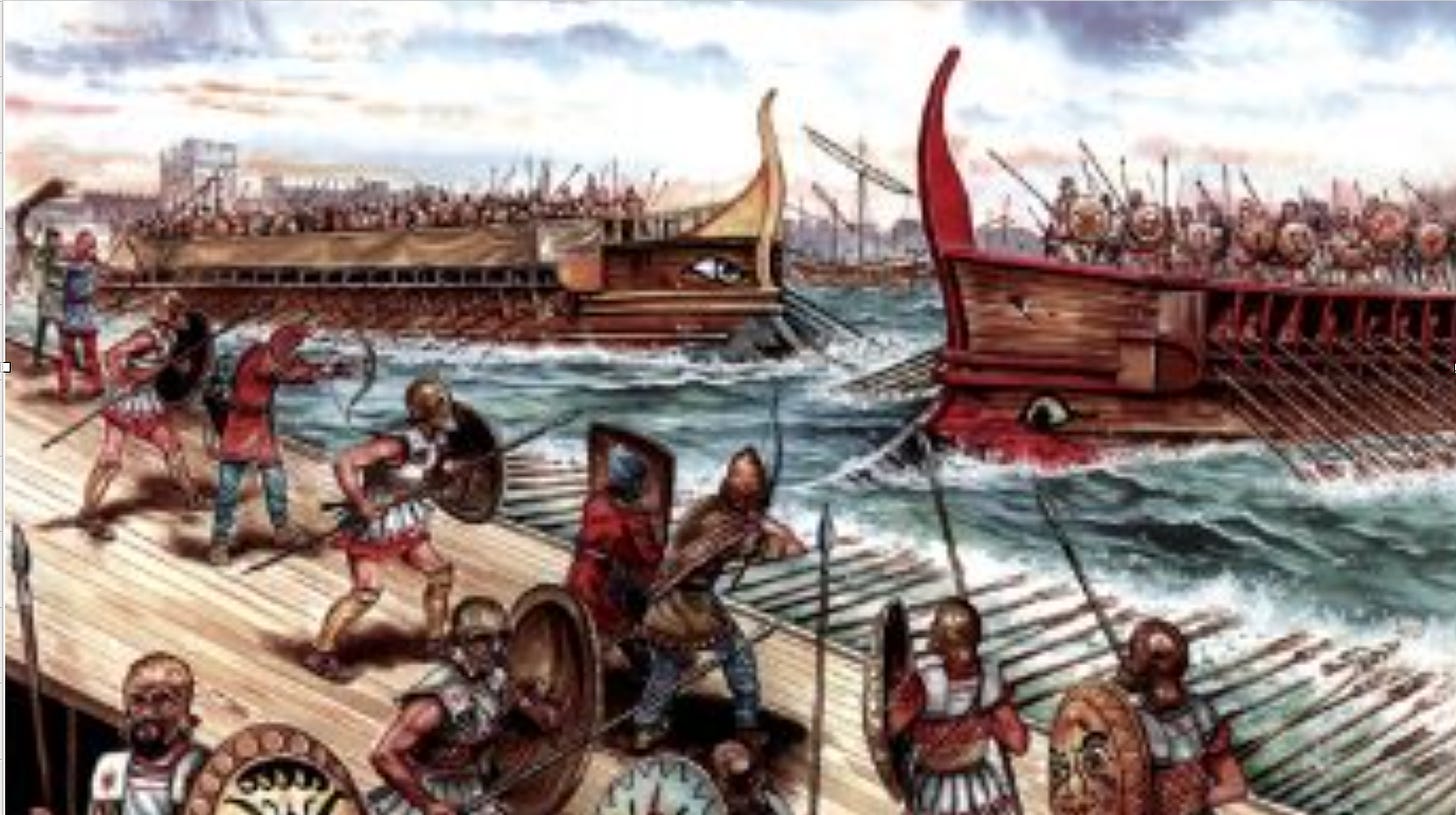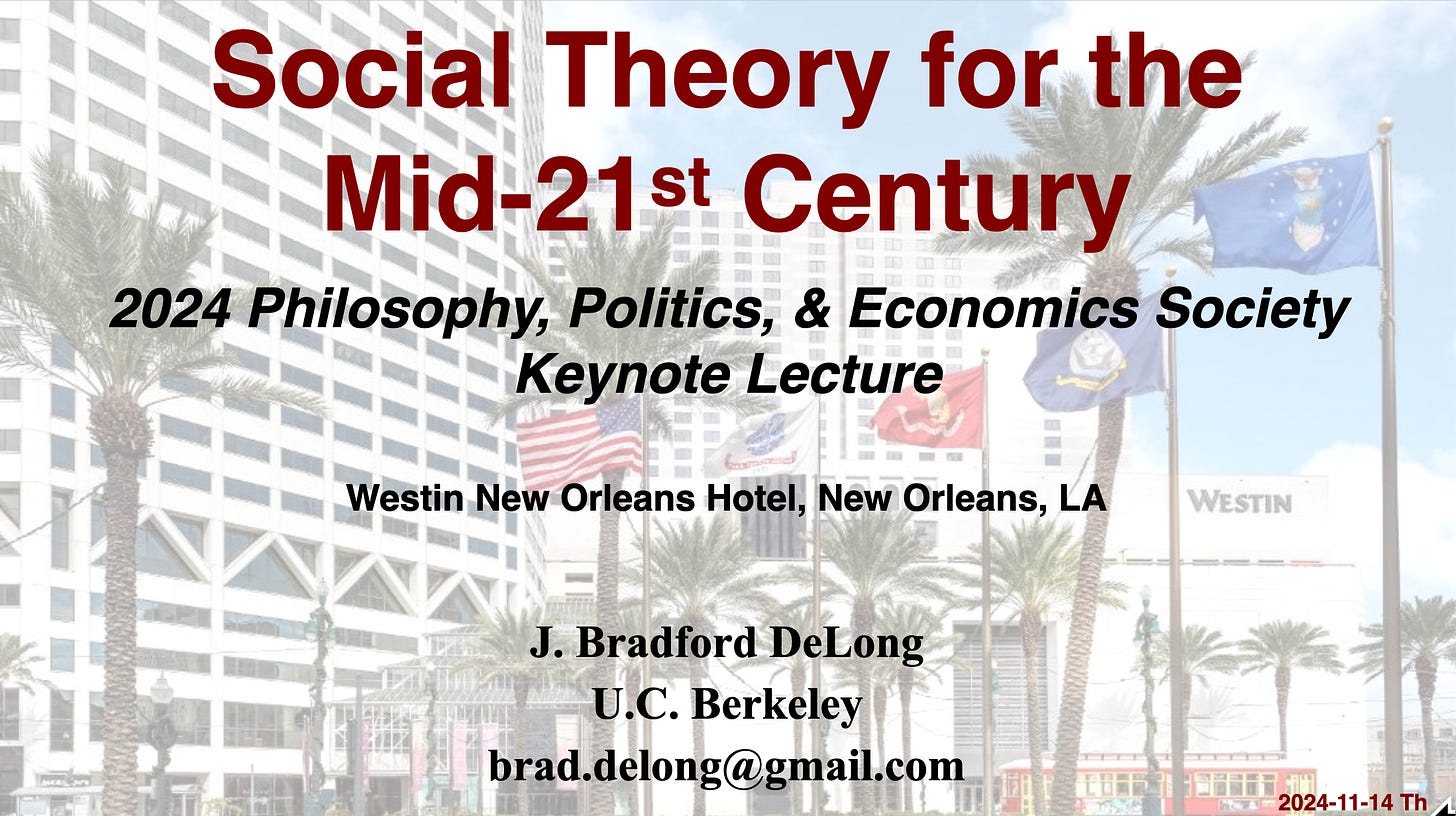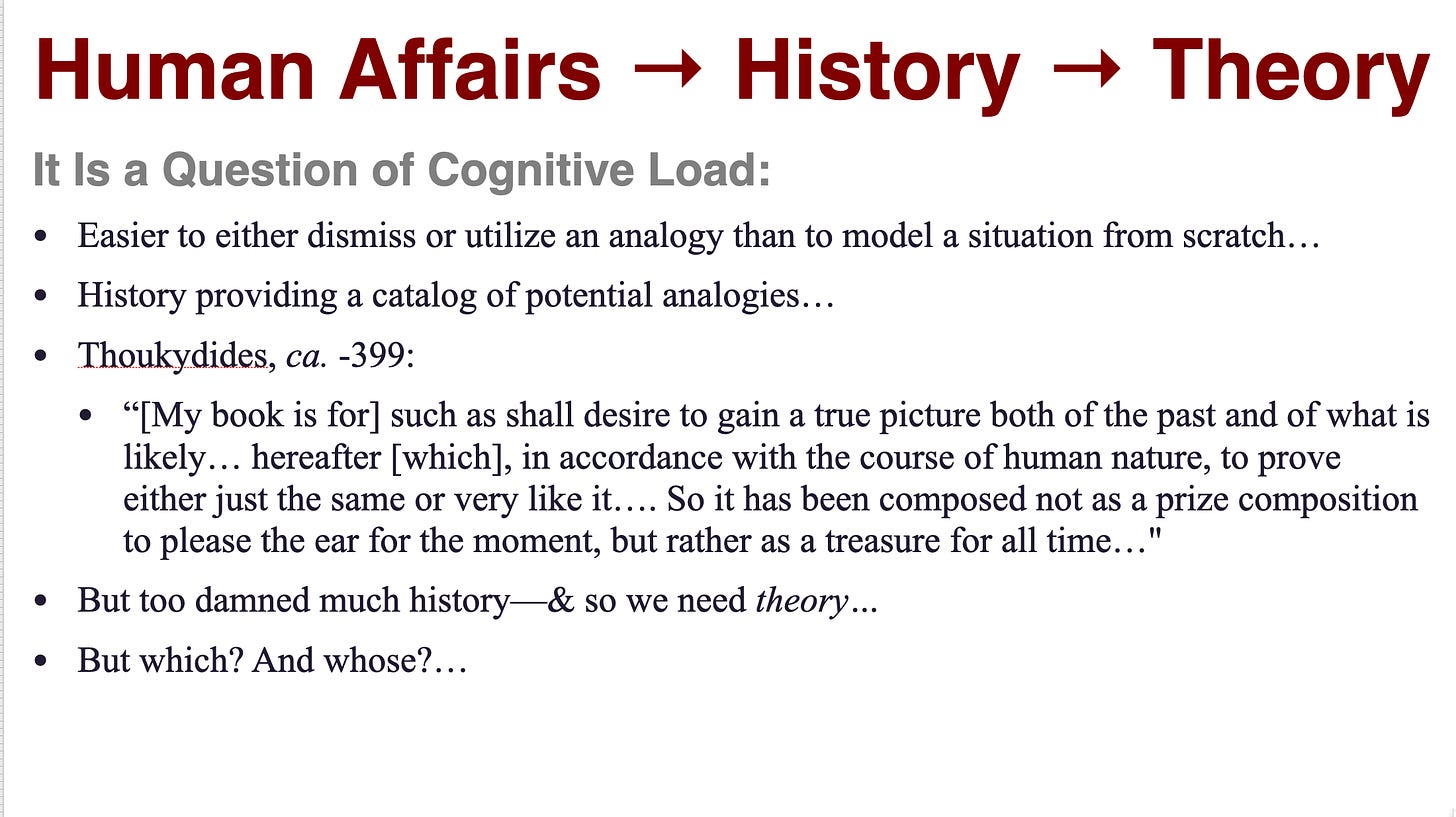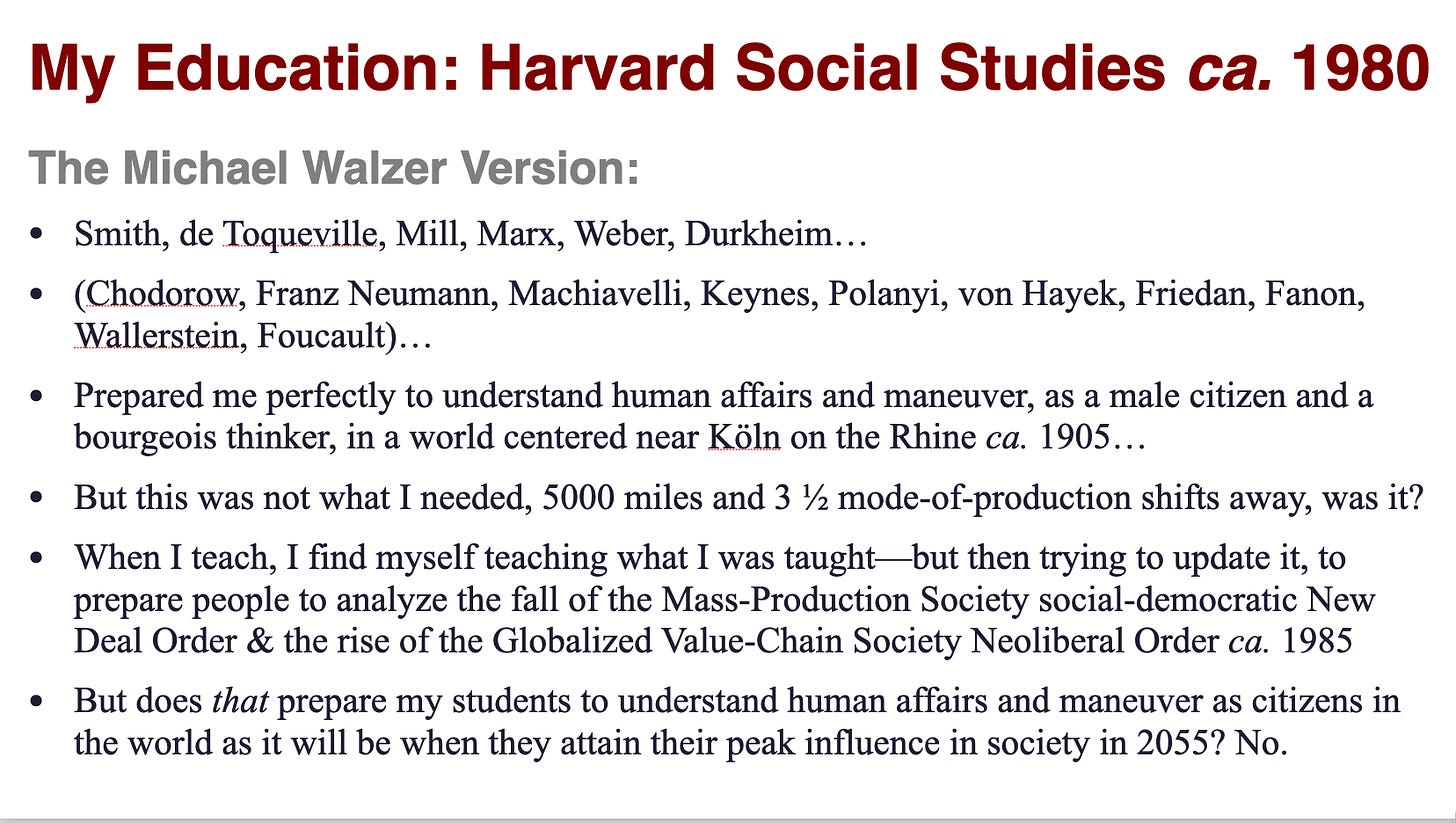Social Theory for the Mid-21st Century: Part I. What Do I Ask My Students to Read so That They Will Understand the World of 2055?
2024 Philosophy, Politics, & Economics Society Keynote Lecture :: Westin New Orleans Hotel, New Orleans, LA :: J. Bradford DeLong :: U.C. Berkeley :: brad.delong@gmail.com :: as prepared for...
2024 Philosophy, Politics, & Economics Society Keynote Lecture :: Westin New Orleans Hotel, New Orleans, LA :: J. Bradford DeLong :: U.C. Berkeley :: brad.delong@gmail.com :: as prepared for delivery [I LIED: I don’t like the pre-delivery text enough to let it out into the wild, so I am revising the most egregious of the mind-os I find as I go back through it. I am dancing as fast as I can!] as revised :: 2024-11-14 Th…
History offers useful analogies, and theory distills their lessons, but are today’s classrooms addressing tomorrow’s realities? It is a great challenge to try to teach students how to understand and maneuver in what will be their world in the future. So please tell me what in the way of theory I should assign to deal with what they will face in the human societal world in 2055:
I. What Do I Ask My Students to Read so That They Will Understand the World of 2055?
1. The Utility? of History
Thank you very, very much for that introduction, for this crowded room, and for the opportunity to take a trip to New Orleans in the fall.
I apologize that I am here a year late. And I apologize that the talk I have this year has many fewer answers than the talk I had ready to givelast year. It has very many fewer answers, largely, because I concluded that the answers I had last year were not right.
Thus, this is going to be a talk that ends up with questions, not answers. It will end with a frantic attempt to pass the baton to all of you—especially the younger ones among you who still have time to think new thoughts and to change their minds—and demand that you come up with the answers. All of you together are certainly wiser than me alone.
Our students are human beings who will spend their lives engaging in human affairs. We should try to teach them how to do this well. In order to gain insight into “human affairs” in general we are led to study history. And from history we are then led to think about and study and create this thing that we call theory: philosophical theory, political theory, economic theory, social theory, and so forth.
I think, at bottom, that it is a question of cognitive load. In this I agree with Dan Davies: is much easier to either dismiss or utilize an analogy than to model a situation from scratch. Our history is great at providing us with a very large library of potential analogies and analogues. We can then run through them, thinking: "no, no, no, no, no, no, no, no, no, maybe, maybe, no, no, no, no, maybe, yes." That this is an important use of history has long been known. In the introduction to his The History of the Peloponnesian War, Thoukydides of the Athenai set it forth as the reason that people should study his book, for he had written his book for:
such as shall desire to gain a true picture, both of the past and of what is likely hereafter, which in accordance with the course of human nature, to prove either just the same or very like it…
Then comes the single most arrogant statement I have ever read from any author anywhere anywhen. He writes that he has succeeded in writing something that is:
not written for a prize composition to please the ear for a moment, but rather is a treasure for all time…
Thrown out of Athens by the twists and turns of Athenian politics, hanging out in exile in weird barbarian places as an ex-Athenian aristocrat, too close to various Spartan sources for the liking of many people in his home city—not a guy doing conspicuously well as an Athenian aristocrat. And yet the guy still is, or at least presenting himself as, the most self-confident individual alive.
2. The Necessity of Theory
Back in the early -300s we had two works of what we call history: Herodotos and Thoukydides. But he started a fad, and the result was a flood of Hellenistic-era histories—nearly all of which are not lost to us, alas!, save as they were compressed into and show up summarized in the biographies of Plutarkhos of Khaeroneia. And people kept writing, and many of what they wrote has survived. So by now we have far too damned much history.
Thus we need theory. We need theory to direct us where to look in the histories in our attempts to find analogies. We need theory because we have no choice but to try to take all the various analogies and to distill them down. I know that this is a very dangerous thing to do. Distilling down all the potential lessons of history into theoretical propositions may wind up giving you something both flat and hallucinatory like Chat-GPT. Worse, perhaps, you wind up taking a fine Bordeaux and turning it into white lightning. It is certainly true that when you imbibe too much theory too quickly, you wind up the following morning with a huge headache, and greatly regretting what you said and did while under its influence.
Nevertheless, we must have theory. We cannot do without it. We are, after all, East African Plains Apes of very little brain, and there is so much that we might choose to try to learn and know.
So: which history, and whose? The answer to that is theory. But at that level thje problem repeats itself: which theories, and whose?
My theoretical education came from the Harvard Social Studies undergraduate concentration circa 1980. Even today, there is a core of me that still is the Michael Walzer version of the Harvard Social Studies interdisciplinary curriculum circa 1980: Smith, de Tocqueville, Mill, Marx, Weber, Durkheim. In junior tutorials and elsewhere people tried to force-feed me more theory: Nancy Chodorow, Franz Neumann, Machiavelli, Keynes, Polanyi, Frieden, Fanon, Wallerstein, Foucault—a whole bunch of others, some of which took and some of which didn't.
The net effect of all of this? It was to prepare me perfectly to understand human affairs, and to maneuver as a male citizen and as a bourgeois thinker, in an area centered around Köln on the Rhine in the years around 1905. I would have been so damned effective as a bureaucrat, as a political actor, as an intellectual back then. I could have absolutely wowed the world.
3. Our Current Problem: Drowning in too Much Theory
But in the 1990s I was 5,000 miles and perhaps three and a half mode of production shifts away. And so my theoretical education was not all that relevant. That problem is constant. Today when I teach, I find myself drifting back to teaching largely what I was taught. And then I find myself frantically trying to update it. And when I come to the end of the course, I look back and find I have prepared people to analyze the 1980s, the fall of the Mass-Production Society social-democratic New Deal Order and the rise of the Globalized Value-Chain Society Neoliberal Order. That is a very important topic. (I think it has been best covered by Gary Gerstle).
But is my preparing people to analyze that really me serving my students? Does that prepare my students to understand human affairs and maneuver as citizens in the world as it is likely to be for them? They are going to attain their peak influence on society and take actions that have consequences in 2055? No, it does not. I am making them skate to where the puck was 40 years ago, not to where the puck will be thirty years hence.
We need to do better. I need now to be teaching my students theoretical perspectives that will enable them to understand what is going to be going on in 2055.
I warn you now that that point—I need a reading list to assign my students if I am to do my job—is where I am going to stop this talk. I do not have a reading list. I have ideas, but I do not trust them. So I am passing the baton to you. I charge you, each of you, to come up with a reading list, and to email it to me.
References:
Davies, Dan. 2023. “The Valve Amplifier of History”. Back of Mind (blog), May 3. <https://backofmind.substack.com/p/the-valve-amplifier-of-history>.
Gerstle, Gary. 2022. The Rise and Fall of the Neoliberal Order: America and the World in the Free Market Era. New York: Oxford University Press. <https://archive.org/details/rise-fall-neoliberal-order>.
Thoukydides. -431 [1910]. The History of the Peloponnesian War. Trans. Richard Crawley. London: J.M. Dent & Sons, 1910. <https://archive.org/details/thucydidestrans00thucgoog>.
If reading this gets you Value Above Replacement, then become a free subscriber to this newsletter. And forward it! And if your VAR from this newsletter is in the three digits or more each year, please become a paid subscriber! I am trying to make you readers—and myself—smarter. Please tell me if I succeed, or how I fail…









Maybe the problem is that the owl of Minerva spreads its wings only with the dusk. Each new mode of production requires its own theory/eplanation, and by the time they arrive the next mode is upon us.
Interestingly, my last grad seminar at San Diego State (poli sci that I never completed) was in IR, and we read Thucydides. The Melian Dialogue served as an introduction to my critique of U.S. policy in Central America, specifically Nicaragua (this was 1984). I soon abandoned poli sci (I was also interested in normative theory driven by my work experience in a retail chain that had liquidated its holdings in 1982, leaving 3,000+ union clerks out of work) for a secondary teaching credential. Seven years after this seminar, I applied and was accepted to a NEH Seminar, The Tragic Voice of Thucydides’ History. Our seminar t-shirt used a portion of the quote you alluded to, albeit from the 1954 Rex Warner translation. I never lost my interest in theory as a way to frame. And I admit that in 2016, I threw my hands up in frustration and consternation as to how to explain what had just happened. Now that I am retired, I am attempting to figure it out. Your post is timely.